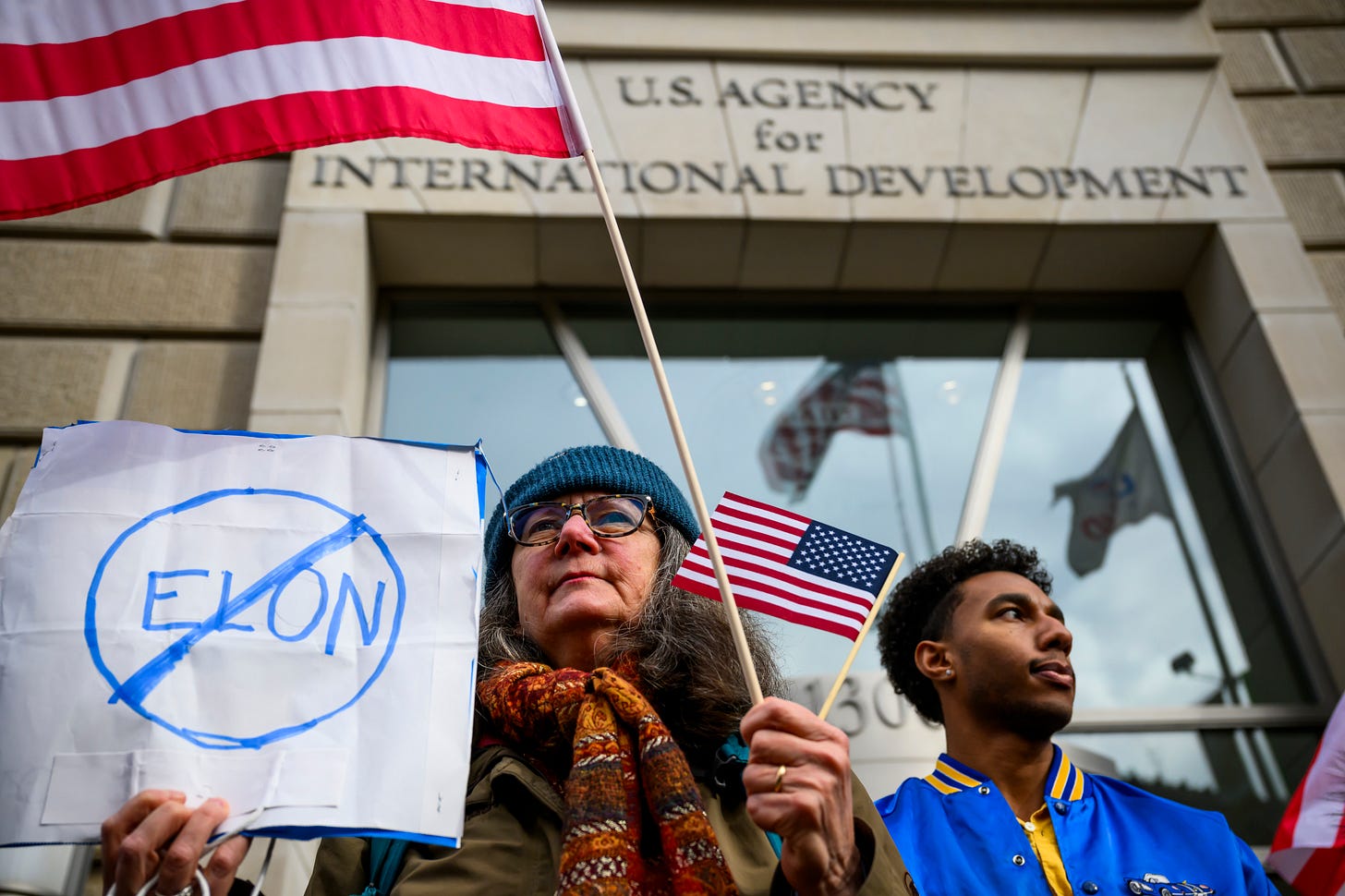Trump Gutting of USAID Moves on to Killing Its Contracts
Documents and lawsuits reveal dozens of live projects being axed.
THE TRUMP ADMINISTRATION BEGAN terminating hundreds of the United States Agency for International Development’s contracts and awards on Tuesday, according to internal documents reviewed by The Bulwark and multiple people familiar with the process.
The exact number of awards and contracts terminated—and what functions they covered—was not known. But one of the people familiar with the process said it would impact “a variety of different countries and sectors” and involved not just future contracts but existing ones. The initial number of proposed terminations, the person said, was 800, though the final figure was whittled down after USAID leaders pleaded their case for maintaining certain functions and funding.
A spokesperson for the White House did not respond to a request for comment. A request for comment made to the State Department, which now houses USAID, was not returned. But one internal document sent to USAID officials on Monday underscored the urgency and scope of the administration’s actions.
“Agency leadership has asked that we move quickly to terminate the awards which have been reviewed and approved by Secretary [Marco] Rubio. I am requesting that you please complete termination notifications from Tranche 1, and Tranche 2 by close of business Tuesday, February 11. I have also linked Tranche 3 to this note,” the document read. “Please have these completed by Wednesday, February 12 close of business.”
A separate document sent to The Bulwark showed a partial list of roughly 80 projects set for termination. Those projects—which included promoting energy reforms, improving public services in several African nations, and even contracting out financial audits for USAID missions—had an estimated “outstanding value” of more than $1 billion.
USAID was the first victim of the Trump administration’s efforts to upend and even destroy the federal bureaucracy. The move to cancel existing contracts, officials say, represents another front in that fight, which is likely to expand across the government and invite additional legal action.
Already, an attempt to put thousands of USAID employees on administrative leave was halted by Judge Carl Nichols of the U.S. District Court for the District of Columbia, who reinstated thousands of employees to their posts, in addition to giving them back access to email, payment, and security notifications. But Nichols, in his decision, declined to put a stop to the funding freeze the administration had applied to USAID operations, stating that plaintiffs had failed to demonstrate that the freeze would cause irreparable harm to USAID contracting officers.
On Tuesday, USAID grantees contractors, and partners filed separate lawsuit, seeking an end to the funding freeze and alleging that it violated “basic precepts of administrative law, numerous federal statutes, and bedrock separation-of-powers principles.” The suit laid out in vivid detail the damage that the freeze was causing, both for the groups themselves (which had begun executing on contracts that now were not being honored) and in terms of real-world harm.
One plaintiff, DAI Global, LLC, alleged that USAID has “failed to make payment on over $120 million in invoices for work” it had “already completed, some of which are now past due.” Another plaintiff, Chemonics, said it had “roughly $103.6 million in outstanding invoices issued to USAID for work performed in 2024, most of which were submitted prior to the stop-work orders.”
The suit alleges that “in Bangladesh, Democracy International has had to stop providing medical care to hundreds of adolescents and young students who were seriously injured and traumatized in the violent crackdowns on protesters last summer, leaving them without necessary medical services.”
It adds that $150 million in Chemonics’s health commodities “remain stranded in warehouses around the world, and $88.5 million are currently in transit.” The suit alleges that these “products risk expiring, being damaged, being stolen, or being delivered without means for pick-up.” All told, “not delivering these health commodities on time could potentially lead to as many as 566,000 deaths from HIV/AIDS, malaria, and unmet reproductive health needs, including 215,000 pediatric deaths.”
The Trump administration has stressed that a spending freeze and a massive staff reduction at USAID is both permissible under Trump’s executive order demanding a reevaluation of foreign aid and necessary in order to effectively audit and judge the merits of the agency. It made such arguments again in a filing Monday night in which it sought to overturn Nichols’s decision to keep thousands of employees from being put on administrative leave. The two plaintiffs in that suit—the American Foreign Service Association (AFSA) and the American Federation of Government Employees (AFGE)—have separately argued that the administration is in noncompliance with the temporary restraining order, noting that there are cases of employees still not having access to USAID facilities.
A USAID official told The Bulwark that, as of Tuesday, a number of employees were indeed still locked out of the agency’s buildings and systems, including people stationed overseas. “It’s a real issue,” the official said. “Essentially they are being held hostage by their own government who sent them there and they can’t leave.”
For those who have been given back access, the work has been distressing, often consisting of efforts to try and convince Trump officials that it would not be wise to tear the agency down to its studs. Less senior employees are left to handle menial tasks while they watch their workplace get gutted.
“Colleagues who got reinstated have nothing to do but respond to random tasks that are meaningless,” said one federal employee. “And if they don’t reply in two or so hours, they are accused of skiving off.”



